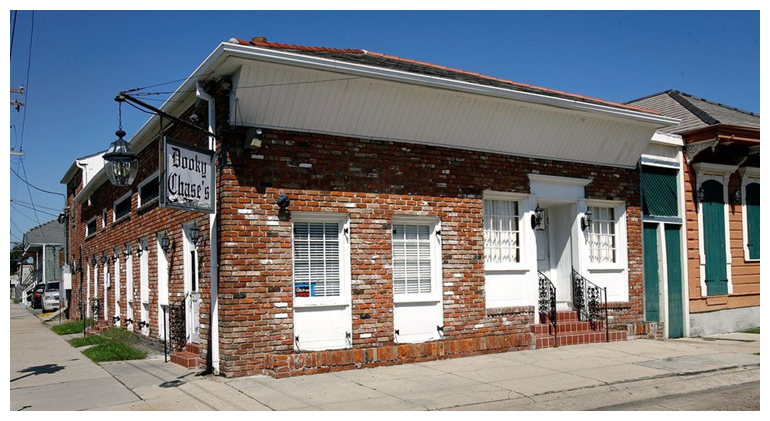History
of Dooky Chase's Restaurant

 ooky
Chase’s Restaurant opened its
doors for business in 1941. What
was initially a sandwich shop and
lottery ticket outlet in 1939 blossomed
into a thriving bar and later a
respected family restaurant in Treme.
Founded by Emily and Dooky Chase,
Sr., Dooky Chase’s Restaurant
soon become the meeting place for
music and entertainment, civil rights,
and culture in New Orleans.
ooky
Chase’s Restaurant opened its
doors for business in 1941. What
was initially a sandwich shop and
lottery ticket outlet in 1939 blossomed
into a thriving bar and later a
respected family restaurant in Treme.
Founded by Emily and Dooky Chase,
Sr., Dooky Chase’s Restaurant
soon become the meeting place for
music and entertainment, civil rights,
and culture in New Orleans.
In
1944, by the time Edgar Dooky Chase,
Sr. was reaching his peak as an
entrepreneur, his son Dooky, Jr.,
had already, at age sixteen, become
well known for his sixteen-piece
“transitional swing to modern
jazz” band. Dooky’s band,
with his sister Doris Chase as vocalist,
was at one time the “most progressive
in the South.” Dooky’s
big band played the bebop sounds
of Dizzy Gillespie and Charlie Parker.
Dooky, Jr. had his father’s
entrepreneurial spirit; and at age
nineteen, he promoted the first
racially integrated concert at the
Municipal Auditorium.
Before
the United States Supreme Court
reversed its 1896 decision, Plessy
v. Ferguson, Dooky Chase’s
Restaurant had become the hot spot
for discussing issues of civil and
economic rights in the African-American
community in New Orleans and throughout
the country. Thurgood Marshall along
with local attorneys such as A.P.
Tureaud, Lionel Collins, Ernest
“Dutch” Morial, and Revius
O. Ortique, Jr. and later freedom
fighters such as Reverend A.L. Davis,
Reverend Avery Alexander, Oretha
Castle Haley, Rudy Lombard, Virginia
Durr, and Jerome Smith propelled
civil rights and protests in the
courts and on the streets of New
Orleans. In the 1960s, Martin Luther
King, Jr. and others would join
these local leaders for strategy
sessions and dialogue over meals
in the upstairs meeting room at
Dooky’s.
Economically,
labor unions were very much in vogue
especially the ILA- International
Longshoreman Union led by Clarence
Chink Henry. While the Mississippi
River drove the economic fortunes
of white-collar freight-forwarders
and cotton and banana traders, it
also drove the economic fortune
of blue-collar workers in the New
Orleans black community. Black workers
on the river had few places to cash
their checks. There were no black
owned banks then; but there were
black-owned bars like Dooky’s
that had the cash flow and knew
their patrons well enough to take
a chance cashing paychecks every
Friday.